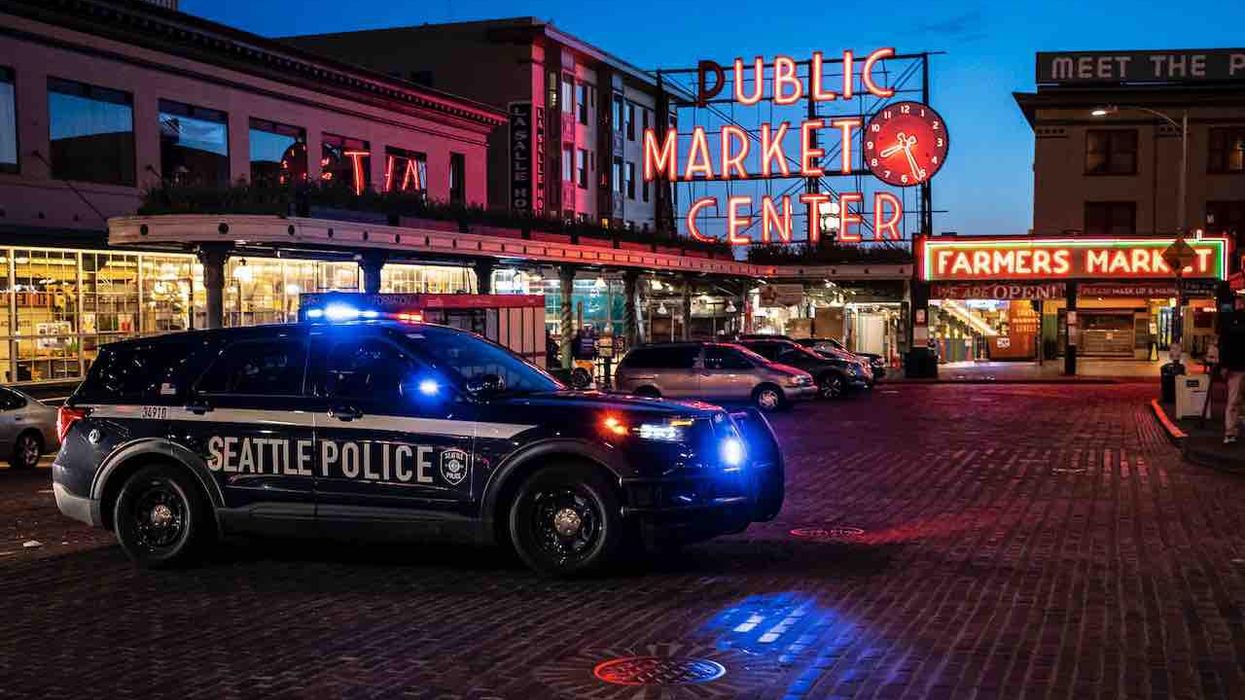
Photo by David Ryder/Getty Images

While Seattle police no longer will enforce certain non-criminal traffic violations due to racism and equity concerns, officers told conservative commentator Jason Rantz that the new policies will embolden lawbreakers to commit more serious crimes.
Interim Chief Adrian Diaz announced Friday that the following violations no longer can be the sole reason officers pull over folks, Rantz noted in a piece for KTTH-AM:
"We know there are concerns [that] these violations disproportionately fall on those who are unable to meet financial demands,” Diaz wrote, according to Rantz's piece.
However, folks still can be cited for the aforementioned violations if officers pull them over for more serious reasons, Rantz reported.
Believe it or not, Seattle Inspector General Lisa Judge in a May 2021 memo called for a total ban on low-level traffic stops, KTTH reported, adding that she claimed police pose a risk to black drivers they pull over.
“Police and community are destined to continue the same cycle of traffic stops gone wrong,” Judge wrote, according to the station. “To that end, the issue of what and how conduct should be policed is perhaps as important as other root causes, such as institutional racism and subconscious bias. For safety of both officers and the public and for racial fairness, SPD should seek to eliminate routine traffic stops for civil and non-dangerous violations.”
The police union successfully pushed back against Judge's radical demands, Rantz said, yet fears remain that such proposals aren't necessarily dead but just delayed.
And even though the move was modified to eliminate only certain low-level traffic stops, Rantz wrote that those very stops — e.g., expired registrations, issues with tags — can signal more serious criminal activity afoot.
“If we stopped conducting traffic stops for all traffic violations in the city, doing so would have catastrophic impacts to our community’s public safety interests,” Seattle Police Officers Guild President Mike Solan told Rantz on his KTTH radio show. “Moreover, if you were to compare today’s decision to what Inspector Judge first publicly said in May, today’s decision is a reasonable approach. Having said this, this decision will still have negative impacts to our community’s public safety interests and still supports the preposterous notion that police still engage in bias policing with traffic stops.”
Rantz reported that a source with "close knowledge of the negotiations around these policies" said that the Seattle Police Officers Guild vigorously fought against no longer enforcing all traffic stops for minor violations, arguing that the outcome would be a "lawless free-for-all."
One officer told Rantz that policies removing officers' enforcement parameters will only lead to trouble.
"Auto theft is off the rails, and they switch plates all the time, or take them off and make fake temporary tags,” the officer noted to Rantz in regard to taking problematic vehicle plates off the enforcement list.
A second officer told Rantz of much scarier possible scenarios.
“Right off the top of my head, anybody who has kidnapped a child and takes their license plates off … or they have a matching vehicle for a bank robbery, and they’ve taken the license plates off … we’re not going to be able to stop them,” the officer noted to Rantz. “And the criminals already take the license plates off of stolen cars to go commit other crimes like armed robberies and carjackings.”
More from Rantz's KTTH piece:
What’s worse, thanks to statewide police reform bills, police can only detain suspects with probable cause. The previous standard was reasonable suspicion. For example, if an officer suspects a car is stolen due to missing registration, a suspicious-looking driver, and even a bullet hole in a windshield, they couldn’t detain the motorist because it wouldn’t meet probable cause.
“I can’t tell you how many gangsters have cars that were shot up three weeks ago but [have] nothing to do with a current crime,” a third officer told Rantz.